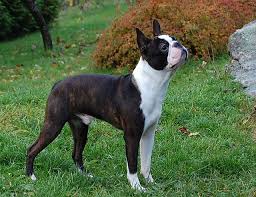
Boston Terrier
Conditions of detention
Boston Terriers are highly adaptable and can thrive in various living conditions, from apartments to larger homes. They do well in urban environments due to their small size and moderate exercise needs. However, they are sensitive to extreme temperatures and should not be exposed to very hot or cold weather for extended periods.
Useful Fact: Boston Terriers are relatively low-maintenance in terms of space, but they benefit from having a comfortable indoor environment with access to daily walks and playtime.
Nutrition and diet
A balanced diet tailored to the Boston Terrier’s age, size, and activity level is essential. High-quality commercial dog food or a veterinarian-approved homemade diet can meet their nutritional needs.
Useful Fact: Boston Terriers are prone to obesity, so it’s important to monitor their food intake and avoid overfeeding, especially with treats.
Health
Boston Terriers are generally healthy but can be prone to certain conditions like brachycephalic syndrome, eye problems, and allergies. Regular veterinary check-ups are crucial to maintain their health.
Useful Fact: Due to their short snouts, Boston Terriers can experience breathing difficulties, especially in hot weather or during strenuous exercise. Owners should be mindful of their breathing and avoid overexertion.
Grooming and care
Boston Terriers have a short, smooth coat that requires minimal grooming. Regular brushing, nail trimming, and dental care are important parts of their routine. Bathing should be done as needed, depending on their activity level and exposure to dirt.
Useful Fact: Despite their short coat, Boston Terriers can shed, and regular brushing can help minimize loose hair around the home.
Education and training
Boston Terriers are intelligent and eager to please, making them relatively easy to train. Positive reinforcement techniques work best. Early socialization and obedience training are important for well-rounded development.
Useful Fact: Boston Terriers can be stubborn at times, so consistent and patient training is essential to ensure good behavior.
Toys and entertainment
Boston Terriers are playful and enjoy a variety of toys, including chew toys, interactive toys, and puzzle toys. Regular playtime helps keep them mentally and physically stimulated.
Useful Fact: Providing a variety of toys can help prevent boredom and reduce the likelihood of destructive behavior.
Safety
Safety is paramount for Boston Terriers, especially because of their brachycephalic nature. They should always be supervised around water and during outdoor activities to prevent accidents.
Useful Fact: Due to their prominent eyes, Boston Terriers are more susceptible to eye injuries. Owners should take care to avoid situations where their eyes could be hurt.
Accessories
Collars, harnesses, and leashes are essential for Boston Terriers. A harness is often recommended to prevent strain on their necks during walks. Additionally, they may benefit from protective clothing in cold weather.
Useful Fact: Using a harness instead of a collar can help prevent respiratory issues that may arise from pulling on a leash.
Socialization
Early and ongoing socialization is important for Boston Terriers to ensure they are friendly and well-adjusted. Exposure to different people, animals, and environments helps prevent behavioral issues.
Useful Fact: Well-socialized Boston Terriers tend to be more confident and less prone to anxiety in new situations.
Travel and Transportation
Boston Terriers can be good travel companions due to their small size and adaptable nature. They should be secured in a pet carrier or with a harness during car rides and have access to water and regular breaks.
Useful Fact: Because of their brachycephalic anatomy, Boston Terriers may have difficulty breathing on airplanes, and some airlines have restrictions on flying them.
Behavior and psychology
Boston Terriers are affectionate, loyal, and enjoy being around their families. They can sometimes exhibit stubbornness but are generally friendly and sociable.
Useful Fact: Boston Terriers often have a strong bond with their owners and can be prone to separation anxiety if left alone for extended periods.
Legal aspects
Owners should be aware of local regulations regarding dog ownership, including leash laws, licensing, and breed-specific legislation.
Useful Fact: Some regions have specific requirements for owning brachycephalic breeds, especially regarding air travel and housing restrictions.


